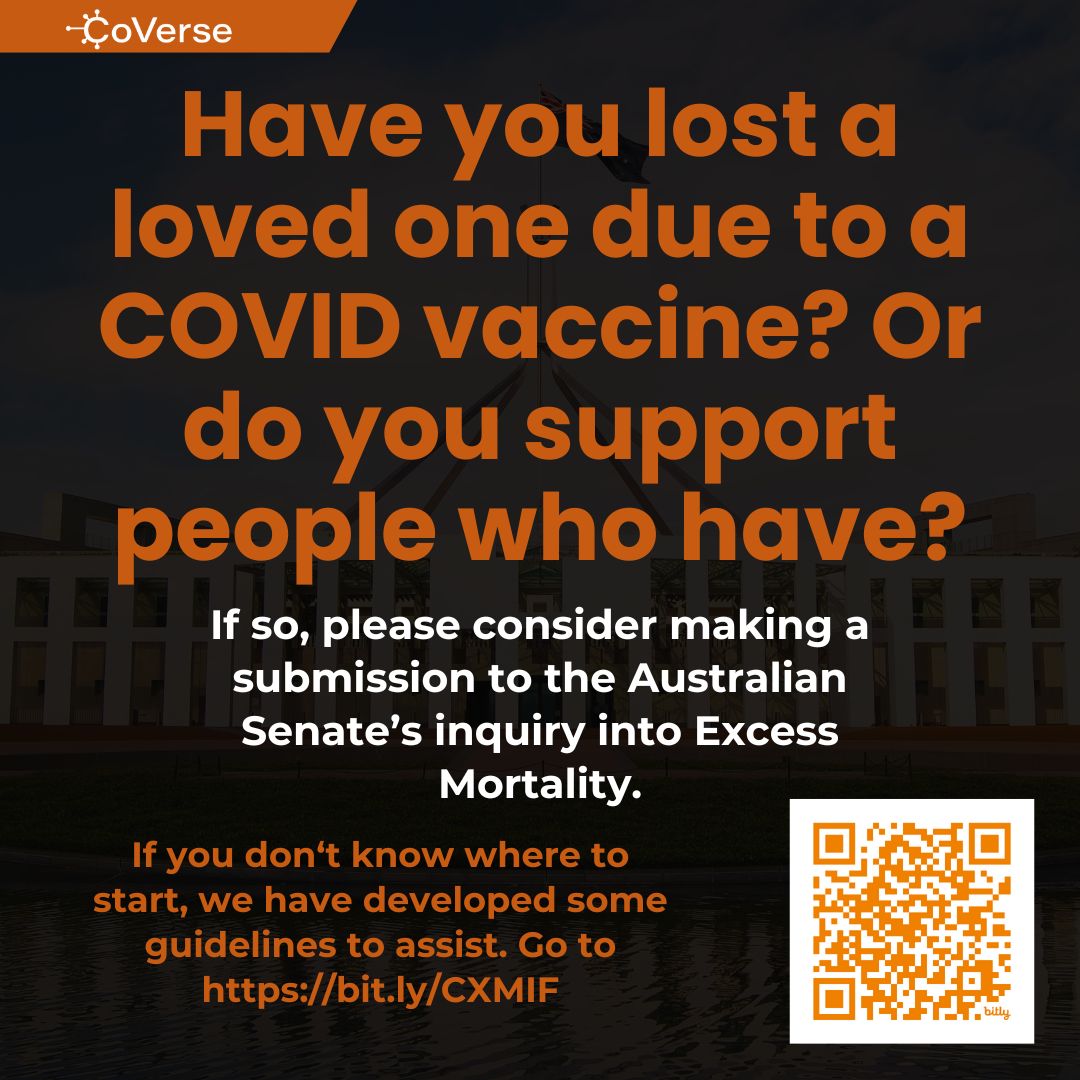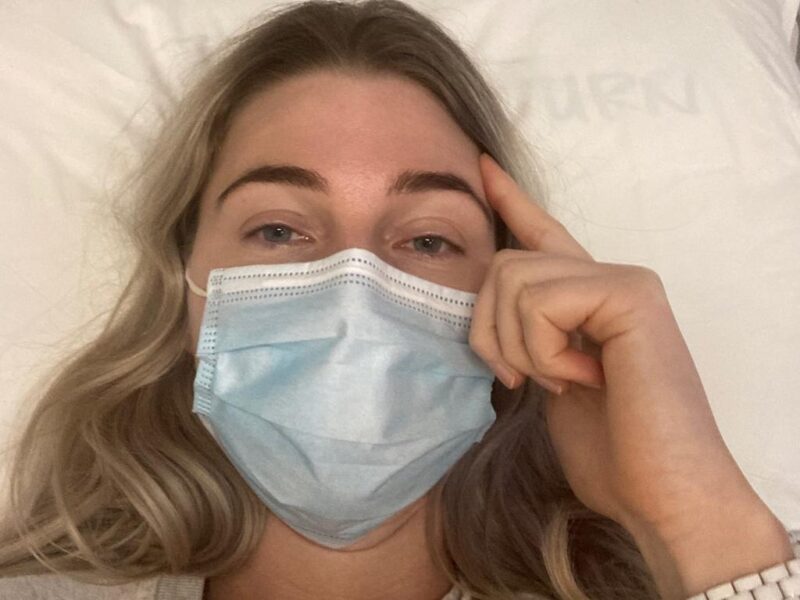Update June 2024
COVERSE was invited to provide evidence before the Senate. You can watch the proceedings here: coverse.org.au/excessmortality
Have you lost a loved one due to a COVID vaccine? Or do you support people who have?
If so, please consider making a submission to the Australian Senate’s inquiry into Excess Mortality.
Below are some simple suggestions on how to make a valuable contribution to this inquiry, which you can download as a PDF file for sharing via email etc.
Note: this inquiry is looking at all excess deaths during 2021-2023 (i.e. more deaths than we normally expect), however the information below is specific for people who have lost a loved one or friend to the COVID vaccines.
Details
Deadline
Friday 17th May 2024
Where to submit
online: www.aph.gov.au/Parliamentary_Business/Committees/Senate/Community_Affairs/ExcessMortality47
email: community.affairs.sen@aph.gov.au
Who should make a submission
Anyone who has lost a close relative or friend during 2021-2023 that is suspected to have been due to their Covid vaccinations, and who is familiar with the details and circumstances of their death.
Why should you make a submission
There have been many concerns raised about the under-reporting, under-acknowledgement, and lack of investigation of serious harms (including deaths) related to the Covid vaccines. If you have evidence on this issue, through your personal story or that of a loved one, then we encourage you to make a submission.
Things will only change when we participate in these kinds of parliamentary processes,. Whether or not a story of a bereaved person has already been shared with the media or you have tried to communicate with a local MP, it is extremely important that this inquiry receives the stories of the bereaved to reveal the reality of Covid vaccine deaths alongside other deaths during the pandemic.
How to write a submission
It is a very simple process to write a letter to the Committee. There are some basic guidelines on the submission page. Essentially, unless you are an expert, the best way to write a submission is to simply tell the story of what happened, as clearly and succinctly as possible. Senate committees don’t like to read huge complex documents. Stick to the facts, and if you are making any assumptions please be clear about them also.
Protecting Privacy and assisting the bereaved
When you make a submission you can request that it be kept completely confidential, and not made public. Or you can say that you are happy for it to be published, but want your name kept confidential. We do, however, ask people to consider allowing their name and submission to both be made public in order to improve the transparency and credibility of the evidence being presented. Please be very mindful of the privacy of any people that you name in your submission, including any people who have passed.
If you are not directly affected by bereavement but have the capacity to help bereaved friends and family submit to this inquiry, please reach out respectfully to:
- alert them to this inquiry, submission requirements and deadline,
- ask if you can assist them to prepare their submission,
- show them where they can get further assistance.
It is important that stories of the bereaved are gathered and shared with sensitivity, and attention to verifiable detail wherever possible. The integrity of reporting is crucial — both for accurate government processes, and for the wellbeing of people in our community who are most severely affected by grief and censorship. We do not need to further sensationalise or traumatise anyone dealing with the ongoing impacts of this issue.
What to include
Start by clearly stating what aspect of the Terms of Reference your submission is relevant to. For many people this will be “(d) any other related matter”.
Outline the circumstances surrounding the death of your loved one, or of your own vaccine-injury story:
- Their age, health and lifestyle prior to their Covid vaccinations.
- Why did they take the Covid vaccine, and which brand did they take?
- Any health complications that occurred within a few weeks of their vaccinations, and the timeline of these complications.
- Doctor and hospital responses to these health issues, and their opinions on the connection with the vaccine.
- What was the official cause of death of your loved one?
- What did the doctors/hospital say about the circumstances of their death, and was this different from the official cause of death?
- Was an autopsy undertaken, and if not why not?
- Was there a coronial inquest into the circumstances surrounding their death, and if not why not?
- If there was suspicion that the Covid vaccine might have been implicated, was it reported to the TGA or state health authorities? And, if so, did they ever follow up or make any further investigations?
- Detail any other failures, omissions, gaslighting, dismissiveness or other issues that arose as part of the circumstances surrounding your loved one’s death / your own vaccine injury.
- If the vaccine was never acknowledged to have played a role, what has led you to suspect that it was involved?
- If you wish to tell your story from the position of a ‘vaccine injury survivor’, you will need to explain why you think your story is relevant to excess deaths. For example, if your vaccine injury was never reported to or followed-up by the TGA then it might be reasonable to assume that the same is also happening in the case of deaths subsequent to vaccination. Or, if you feel that you had a serious adverse reaction to your vaccinations but your doctors dismissed your concerns, despite no other explanation given. Explain why these matter for an inquiry into excess deaths.
Any final message you would like the Committee to know.
What not to include
Avoid making accusations against any individuals or organisations. Simply lay out the facts and events as they happened. It’s ok to describe what doctors did or didn’t do, but it becomes problematic if you accuse them of a cover-up, for example.
Don’t head off on tangents about broader pandemic or public health issues, unless specific policies, laws or mandates are directly relevant to the specific situation (e.g. your loved one died after taking a vaccine that their work mandated them to have). Those other issues may be important, but this inquiry is looking specifically at excess deaths, and so your evidence should try to stick to that issue as closely as possible.
Need more help?
If you need more info or help, contact the Committee Secretariat (community.affairs.sen@aph.gov.au / 02 6277 3515) or reach out to COVERSE (contact@coverse.org.au).




